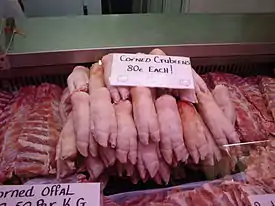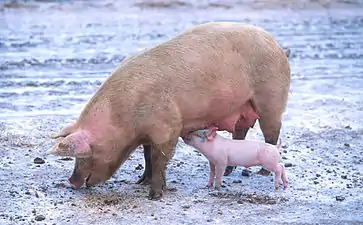Pig's trotters
A pig's trotter, also known as a pettitoe,[1] is the culinary term for the foot of a pig. The cuts are used in various dishes around the world, and experienced a resurgence in the late 2000s.[2]
.jpg.webp)
Description


Before sale, the trotters are cleaned and typically have the hairs pulled with a hot tank and beaters.[3] They are often used in cooking to make stocks, as they add thickness to gravy, although they are also served as a normal cut of meat.[3] In Puerto Rico, a tomato-based stew of pig's trotters with chickpeas is called Patitas de Cerdo. Sometimes potatoes or butternut are added. Chef Marco Pierre White has long served trotters at his restaurants,[4] based on the original recipe of mentor Pierre Koffmann.[5] In the New York City restaurant Hakata Tonton, 33 of the 39 dishes served contain pig's trotters.[6]
Following the late-2000s financial crisis, there has been a boom in popularity of pig's trotters in the United Kingdom as a revival in cheap meat recipes occurred.[2] In 2008, British supermarket Waitrose reintroduced trotters to its stores,[4] and found that they quickly became popular.[2] In 2009, Pierre Koffmann set up a pop-up restaurant, and found that diners ate an entire month's stock of 500 pig's trotters in less than a week.[2]
In Norwegian tradition pigs feet are salted and boiled and served as syltelabb. This is a pre Christmas dish because the pig was slaughtered before Christmas, and everything was used. Today syltelabb is for enthusiasts.[7]
Recipes and combinations

- Bean crock (les pais au fou) in Jersey, Channel Islands
- Cappello da prete in Modena, Italy
- Cotechino in Modena, Italy
- Crubeens in Ireland
- Pied de cochon in Sainte-Menehould, France
- Tebichi in Okinawa, Japan
- Tom tin moo in Laos
- Crispy pata, paksiw na pata, and patatim in the Philippines
- Zampone in Modena, Italy
- Manitas de cerdo in Spain
- Jokbal in Korea
- Souse in Barbados and St. Vincent and the Grenadines
- Spitzbein or Pfoten in German, known as golonka in Polish
- Syltelabb is a traditional Norwegian dish
- Kha mu, lit. "pigs' feet" in Thailand influenced by Chinese stewed pork
- Patitas con maní and Sarza de patitas in Peru[8][9][10]
References
- "Pettitoes Definition". Merriam-Webster Dictionary. Retrieved 29 May 2016.
- Carmichael, Sri (21 October 2009). "Pig's trotters fly off the shelves as customers seek cheap meat cuts". The Evening Standard. Archived from the original on 24 October 2009.
- Heath, Adrian (30 October 2009). "A modern bargain: Pig's Trotters". BBC News.
- Wallop, Henry (21 September 2008). "Credit crunch sees Bath chaps, ox cheek and pigs trotters return". The Telegraph.
- Cooke, Rachel (20 June 2010). "Pierre Koffmann: 'Not enough British chefs cook from the heart'". The Guardian.
- MacDonald Smith, Fiona (3 March 2008). "Pigs' feet: the new superfood". The Telegraph.
- https://thornews.com/2011/12/31/syltelabber-pickled-pigs-feet/ thornews
- Acurio, Gastón (2008). Larousse de la gastronomía peruana: diccionario gatronómico ilustrado (in Spanish). Lima: Q.W. Editores. p. 293. ISBN 9789972589379.
- "Una delicia del Cusco, sarza de patas de cerdo". Cuzco Eats (in Spanish). 2018-01-09. Retrieved 2019-08-23.
- "¿Cómo se prepara las patitas con maní? Aquí te enseñamos". wapa.pe. Retrieved 2019-08-23.
External links
| Wikimedia Commons has media related to Pork feet. |
| Wikibooks Cookbook has a recipe/module on |
